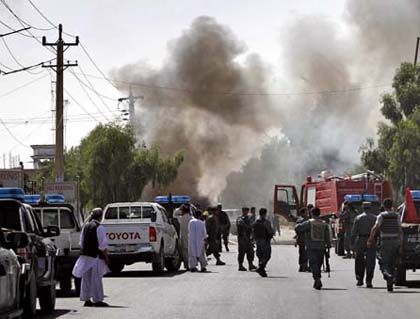Last week the reports were highly terrible. According to the news, four police officers were killed and 19 others injured following an explosion in central Maidan Wardak province of Afghanistan on Monday. Nearly 20 Afghan national security forces were killed in clashes broke out between Afghan police and Taliban militants in Bala Morghab District of Badghis province. Three police officers were killed and six others injured, including district security chief for Arghandab, in an explosion in south-eastern Zabul province on Tuesday. A motorbike packed with explosives went off in eastern Nangarhar province leading to the injuries of seven people. Moreover, 15 people were injured in another explosion in Marja District of Helmand province on Tuesday.
In addition, Transparency International’s Corruption Perceptions Index 2013 has been released and Afghanistan made up one of the worst performers, scoring just 8 points among 177 countries the same as Somalia and North Korea.
Meanwhile, the officials of the Ministry of Public Health announced recently that cases of the AIDS/HIV virus in Afghanistan were up by 38 percent from last year.
According to last month’s report, the Afghan Opium Survey for 2013, projects that the land area used for opium cultivation in Afghanistan, long the dominant supplier of most of the world’s heroin, reached a historic high in 2013 of 516,000 acres, a 36 percent increase from 2012. Now, 19 of the country’s 34 provinces are opium growers, also an increase, and overall production was up by almost half – 49 percent – from the previous year.
According to officials, among the biggest beneficiaries of the illicit opium economy have been the Taliban militants. They have opposed eradication efforts in order to build support among farmers in rural areas crucial to their insurgency, particularly in the southern provinces of Kandahar and Helmand. And where opium is produced in areas where they are prevalent, they assess a 10 percent tax on it, a major source of finance for their activities.
In addition, Afghanistan has a rapidly growing addiction, problem of its own, with more than 5 percent of the population estimated to be using drugs, one of the highest rates in the world.
The graph of violence against women remains high in the country. Murdering women in desert court, torturing them mentally and physically, hanging them on trees and other tragic violence is making the headlines of the newspapers in Afghanistan.
Afghan people are suffering severely from the chronic disease of poverty. Moreover, the coldness of winter and inflation compound their hardships. The vendors, who are mostly children, are trembling with cold in the streets and laboring from dawn to dusk for earning a morsel of bread. The condition is getting hard and harder for them in winter from one day to the next!
Afghan people are in deep fear and despair especially when observing the shocking crises happening one after another. The security situation is worsened recently which seems an alarming danger for the country. The volatile security condition, increase in corruption, poppy cultivation, economic crunch, and many other untoward incidents add to the despondency of the people.
It is highly surprising for me that in such a chaotic situation, the Afghan officials are too indifferent to voice up and take an effective action against the current crises.
Furthermore, the paradoxical attitude and reaction of presidential office compound my surprise. When a single Afghan civilian is killed unintentionally by US drone attack, it denounces the action strongly; however, when tens of civilians along with Afghan National Police lose their lives daily in Taliban’s attack, explosions, and roadside bombs there is no voice raised. This remains a great puzzle for me which mostly occupies my mind. Indeed, what is going on in the minds of the ‘responsible Afghan officials’? Why they are strongly sensitive to the death happening by foreign drone strike whereas they remain unconcerned with the same action taking place by Taliban insurgents?
The reports show that in the last decade of current government, no major positive changes took place. In other words, none of the country’s challenges have been ended. Moreover, in spite of spending all time and energy regarding making peace with Taliban, it has met failure. Now, a question arises in one’s mind that what if refusal of signing the pact be the last try of Afghan President to gain the satisfaction of Taliban? Perhaps, this might be one of the reasons.
The strong concern of current government about Taliban is also one of the mind-boggling issues. Indeed, its patience regarding the deadly acts of Taliban was beyond belief. It tried all possible ways to gain their happiness. Moreover, its persistent request for the release of Taliban’s head, Mullah Bradar, displayed its keen interest to them.
In such social, political and economic disorders, signing Bilateral Security Agreement (BSA) seems the only solution for the challenges. But, in spite of people’s opinions pushing for signing the pact, President Karzai is still tossing a coin.
It is believed that if the security agreement be left unsigned, Afghanistan will backtrack and retrace its past, and the bloody history of Taliban’s time will be repeated once more. Once again our people will be burning in the furnace of Taliban’s rage and barbarity. Of course, the only reason behind Taliban’s disapproval about signing the pact is nothing other than their sinister plan. That is why they are sharpening their knives, hoping to see the back of the Americans and NATO departing the country for good next year. An Afghan writer says very truly, “If it is not signed and foreign troops must withdraw completely, the situation is ripe for terrorist outfits to create and fill a security vacuum. It will be hard for needy Afghan forces to defend against these groups without strong logistical and financial backing.” Moreover, the emergence of sectarian violence and civil war seem beyond a shadow of a doubt. In short, it will jeopardize the life of each Afghan through starting a risky scenario.

